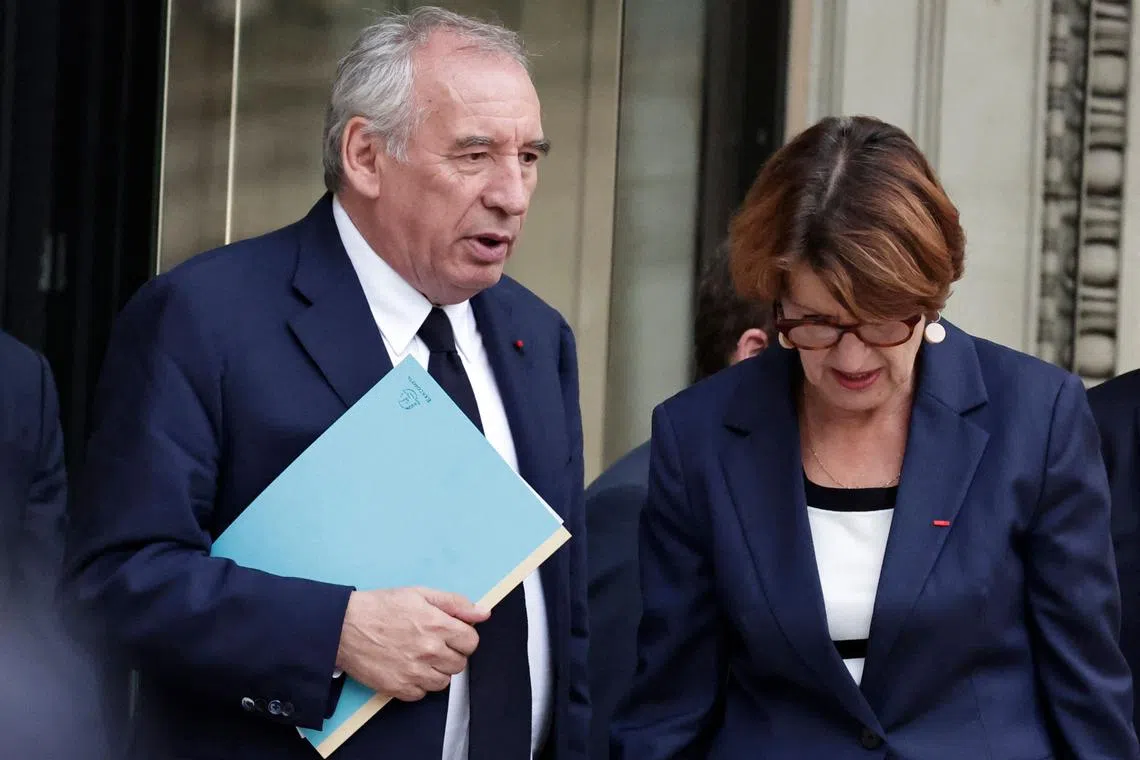Francois Bayrou resigns as French PM, Macron seeks successor
Sign up now: Get ST's newsletters delivered to your inbox

France's Prime Minister Francois Bayrou, flanked by Agriculture and Food Sovereignty Minister Annie Genevard (right), leaving the National Assembly after the vote.
PHOTO: AFP
PARIS – Prime Minister Francois Bayrou submitted his resignation to President Emmanuel Macron on Sept 9 after France’s Parliament ousted the government, with the French leader under pressure to find a successor in a deepening political crisis.
On Sept 8, Mr Bayrou suffered a crushing loss in a confidence vote he had himself called, plunging France into fresh uncertainty and leaving Mr Macron with the task of finding the seventh premier of his mandate.
The French presidency said in a statement that Mr Macron “took note” of the outcome and said he would name a new premier “in the next days”, ending any remaining speculation that the president could instead call snap elections.
Mr Bayrou was seen by AFP correspondents arriving at the Elysee Palace to hand in his resignation and then leaving just over an hour later.
A source close to Mr Bayrou, asking not to be named, confirmed he had submitted his resignation to Mr Macron.
Mr Bayrou remains in charge on a caretaker basis until a successor is named.
The French president has in the past been notoriously slow in “casting” a new prime minister.
But he is widely expected on this occasion not to procrastinate given the risk of financial and political stability.
“Emmanuel Macron is now in the front line to find a solution to the political crisis,” said the Liberation daily.
France’s borrowing costs, a measure of investor confidence in a country, on Sept 9 surged slightly higher than those for Italy, long one of Europe’s debt laggards.
Vulnerable
Mr Bayrou had blindsided even his allies by calling a confidence vote to end a lengthy stand-off over his austerity budget, which foresaw almost €44 billion (S$66 billion) of cost savings to reduce France’s debt pile.
In the vote in the National Assembly, 364 deputies voted that they had no confidence in the government while just 194 gave it their confidence.
Mr Bayrou was the sixth prime minister under Mr Macron since his 2017 election but the fifth since 2022.
His predecessor, Mr Michel Barnier, was brought down by a no-confidence vote in December 2024, and the crisis dates back to summer 2024 legislative elections that resulted in a hung parliament.
“Emmanuel Macron, a vulnerable president,” said the Le Monde daily.
Critical juncture
Mr Macron, who has been leading diplomatic efforts internationally to end Russia’s war on Ukraine, now faces one of the most critical domestic decisions of his presidency over whom to appoint as premier.
The Socialist Party (PS) has expressed readiness to lead a new government but it is far from clear whether such an administration led by a figure such as PS leader Olivier Faure could survive.
If Mr Macron opts for a centrist who enjoys his trust, the president could name a figure like Defence Minister Sebastien Lecornu, whose future is the subject of intense speculation.
Mr Lecornu has been in his post more than three years, for most of Russia’s invasion of Ukraine, and is a staunch supporter of Kyiv. He is seen as a discreet but highly skilled operator who, crucially for Mr Macron, himself harbours no ambition of becoming president.
Lower-profile options who could have a better chance of centre-left consensus include Health Minister Catherine Vautrin, Finance Minister Eric Lombard or Parliament speaker Yael Braun-Pivet.
Break with the politics
Alongside political upheaval, France is also facing social tensions.
A left-wing collective named “Block Everything” is calling for a day of action on Sept 10, and trade unions have urged workers to strike on Sept 18.
“We need a prime minister very rapidly” as there should not be a “power vacuum” ahead of the protests on Sept 10, said Interior Minister Bruno Retailleau, who is also leader of the main right-wing The Republicans Party.
The 2027 presidential election meanwhile remains wide open, with analysts predicting the French far-right will have its best-ever chance of winning. Mr Macron is forbidden from standing for a third term in 2027.
The hopes of three-time presidential candidate for the far-right National Rally (RN), Ms Marine Le Pen, depend on the outcome of an appeal hearing in early 2026 over her conviction for a European Parliament fake jobs scam that disqualified her from standing for office.
RN leader Jordan Bardella told broadcaster RTL on Sept 9 the party would move to bring down any government that does not “break with the politics of the last eight years” under Mr Macron, and reaffirmed a call for early legislative elections. AFP


